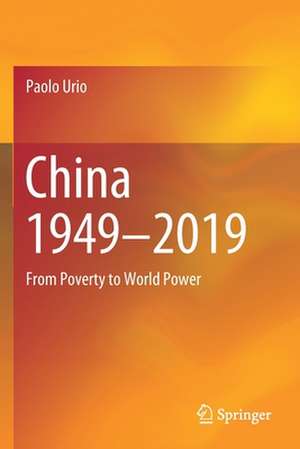China 1949–2019: From Poverty to World Power
Autor Paolo Urioen Limba Engleză Paperback – 14 aug 2020
| Toate formatele și edițiile | Preț | Express |
|---|---|---|
| Paperback (1) | 699.77 lei 6-8 săpt. | |
| Springer Nature Singapore – 14 aug 2020 | 699.77 lei 6-8 săpt. | |
| Hardback (1) | 706.16 lei 6-8 săpt. | |
| Springer Nature Singapore – 9 iul 2019 | 706.16 lei 6-8 săpt. |
Preț: 699.77 lei
Preț vechi: 823.26 lei
-15% Nou
Puncte Express: 1050
Preț estimativ în valută:
133.91€ • 143.19$ • 111.64£
133.91€ • 143.19$ • 111.64£
Carte tipărită la comandă
Livrare economică 17 aprilie-01 mai
Preluare comenzi: 021 569.72.76
Specificații
ISBN-13: 9789811388811
ISBN-10: 9811388814
Pagini: 332
Ilustrații: XX, 332 p. 9 illus., 3 illus. in color.
Dimensiuni: 155 x 235 mm
Greutate: 0.5 kg
Ediția:1st ed. 2019
Editura: Springer Nature Singapore
Colecția Springer
Locul publicării:Singapore, Singapore
ISBN-10: 9811388814
Pagini: 332
Ilustrații: XX, 332 p. 9 illus., 3 illus. in color.
Dimensiuni: 155 x 235 mm
Greutate: 0.5 kg
Ediția:1st ed. 2019
Editura: Springer Nature Singapore
Colecția Springer
Locul publicării:Singapore, Singapore
Cuprins
Chapter 1 Understanding China’s strategic public management.- Chapter 2The New Public Management comes to China.- Chapter 3Putting people first: the implementation of rebalancing policies.- Chapter 4The modernization of the political system.- Chapter 5China: the new super power.- Conclusion China and the West: is a strategic partnership possible?.
Notă biografică
Paolo Urio is a Professor Emeritus of the University of Geneva, where he has been full professor of public administration and public management until 2005. He has been director of the Department of political science (1983-1989, and 2004-2005), Dean of the Faculty of Economics and Social Sciences (1989-1995) and director of the Master in public Management (1992-2005). His main domains of research are strategic public management, policy analysis, decision-making process, New Public Management, and the reform process in China and China’s foreign policy. He has directed the Sino-Swiss Management Training Programme in the Public Sector of China (1997-2003) that trained more than 400 senior Chinese civil servants and party cadres. He visits regularly China since 1997, has several cooperation research activities with Chinese Universities and gives conferences to Chinese Universities and Party schools.
Textul de pe ultima copertă
The objective of this book is to take stock of the research Paolo Urio has conducted since 1997 on the rise of modern China, with emphasis on strategic public management. The starting point of the book is China’s will to recover world power status. This objective is of paramount importance for understanding the policies implemented since 1949, their rationale, content, and consequences upon Chinese society and economy, as well as their sequence in time, i.e. the underlying grand strategy. Starting from these premises, the book proposes an analysis of the contradictions that have developed within China since 1949, the positive and the negative consequences of the public policies implemented to overcome these imbalances, i.e.: the Communist Party’s loss of reputation at the end of Mao era; the introduction of market mechanisms by Deng and the resulting imbalances within Chinese economy, society and environment; the rebalances policies of the Hu Jintao era; and finally the assertivepower policies of Xi Jinping, both nationally, e.g. the fight against corruption, and internationally, i.e. China’s new role in the world, especially as a competitor of the Unites States.
Caracteristici
Provides a comprehensive analysis of China’s strategy for recovering world power status Proposes an evaluation of the reforms introduced in China since 1978 Provides new insights on the consequences of China’s rise upon the West, particularly upon the US
